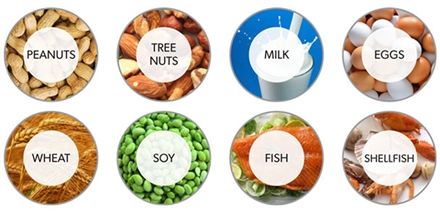

Clinic byte: Food Allergies - React with Respect
Source/Author: Marie Confident, School nurse
May 05, 2016
May is Food Allergy Action Month, and the week of May 8-14 is food allergy awareness week. Food allergies have been on the rise, and it is estimated that one in every 13 children under age 18 is affected. A food allergy is the immune system’s reaction to a food protein it mistakenly identifies as harmful. Initial exposure to the offending food creates a sensitization resulting in an immune response.
The following eight foods account for 90% of all food allergies:
- Peanut
- Tree nut
- Milk
- Egg
- Wheat
- Soy
- Fish
- Shellfish
Reactions may range from mild (rash, hives, itching) to anaphylaxis, a severe allergic reaction involving the entire body and a medical emergency (swelling of throat, mouth, hoarseness, difficulty breathing, wheezing, loss of consciousness even death.) http://www.foodallergy.org/about-food-allergies
If a food allergy is suspected, the person is referred to an allergist who will determine the allergen through a comprehensive history and tests such as skin prick, blood, oral food challenge and trial elimination.
Strict avoidance of the food causing the allergy is the only way to prevent a potential anaphylactic reaction. It is very important to read ingredient labels every time. While 80% of children eventually outgrow their allergy to cow’s milk, egg and wheat by age 16, only 20% outgrow peanut allergies. Fish and shellfish allergies may develop at a later age and tend to be lifelong. Mild reactions (itching and hives) are treated with over-the-counter antihistamines like Benadryl. Epinephrine or epi pen is the drug of choice for anaphylactic reaction and requires a prescription.
An anaphylactic reaction can happen any time and anywhere, so early recognition of symptoms and prompt administration of epi pens saves lives. People with history of anaphylaxis should carry their epipen with them at all times and wear emergency medical identification. Once an epipen is used, 911 should be called and the person needs to be transported by ambulance to an emergency room for further treatment and monitoring. Sometimes reactions may recur a few hours later, so just utilizing an epipen is not enough on its own.
Parents: If your child has been prescribed an epipen for his/her allergy, I encourage you to bring it to the clinic by the first day of school. It needs to be in its original container with its attached label. An allergy action plan needs to be filled out and signed by parents.
At this time, there is no cure for food allergies. Food Allergy Research and Education (FARE) is leading the way in raising public awareness, providing advocacy and education and advancing research to find a cure. Until a cure is found, please react with respect to someone with food allergies.
Until next time, remain healthy!
Marie Confident, RN, BSN
Shorecrest school nurse
























